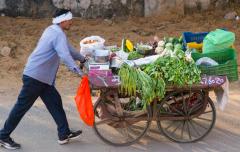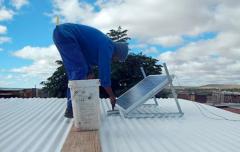Sustainable Cooling for All in a Warmer World
This blog is the first of a four-part blog series focused on growing cooling needs for populations worldwide and opportunities for providing sustainable cooling solutions. The blogs are running in advance of a major report, “Chilling Prospects: Providing sustainable cooling for all,” coming out on July 16. The report is authored by Sustainable Energy for All.
On a hot day, it is too easy to take cooling for granted. Whether it’s the fresh fruit you eat for breakfast, the air conditioning in the workplace or the vaccine that keeps our children safe from common disease.
If these comforts are available to you, consider yourself lucky. For hundreds of millions of children and adults across the world, it’s not so simple and lacking access to basic cooling can be a life or death issue. Look no further than the May heatwave in Karachi, Pakistan where at least 65 people died from sustained scorching temperatures above 40°C (104°F).
As the planet warms and urban populations swell, the urgency for cooling to ensure productive schools and workplaces, healthy food supplies and safe vaccines is growing. And as demand for cooling skyrockets, cities and countries have to manage the growth in ways that don’t exacerbate climate change.
Yet, with roughly 1 billion people lacking access to basic electricity, more still lack access to reliable cooling. This lack of access impedes their ability to lead healthy lives, generate income and stay safe during more extreme heatwaves. Simply put, access to cooling is a fundamental equity issue that will help eradicate poverty and realize the Sustainable Development Goals (SDGs).
The Kigali Amendment under the Montreal Protocol provides an important opportunity to address this colossal challenge. The binding international agreement, ratified last year, calls for reducing production and use of refrigerants, known as hydrofluorocarbons (HFCs), which have high global warming potential by 80 percent in the next 30 years. If realized, the phasedown of these pollutants could prevent dangerous amounts of global warming, and generate opportunities to make our energy systems much more efficient.
But the opportunity is greater still. The intersection of the Kigali Amendment with the Paris Climate Agreement and the Sustainable Development Goals represents a ripe opportunity to re-think our energy systems, cooling appliances, and ‘cold’ supply chains such that we can provide sustainable cooling for vaccines, food supplies and homes.
That’s why Sustainable Energy for All (SEforALL), in partnership with the Kigali Cooling Efficiency Program (K-CEP) launched Cooling for All in 2017. With the help of the Global Panel on Access to Cooling, which includes leaders from industry, philanthropy, academia and government, the initiative aims to identify the challenges and opportunities of providing sustainable, reliable and affordable cooling solutions for the world’s most vulnerable populations.
That means reaching so-called ‘last-mile’ communities where the rural poor don’t have access to electricity or incomes to buy refrigerators or cooling fans. Where fractured cold chains prevent the delivery of life-saving vaccines to local health centers and sale of agricultural goods in more lucrative markets. It also includes the urban poor who may have intermittent access to electricity, and so doesn’t guarantee they can run a fan when extreme temperatures hit.
And, lastly, it’s about the growing number of people who are on the brink of buying a refrigerator or air-conditioner, but their purchasing options may be limited, meaning they may only be able to afford the least efficient one that puts added pressure on already stretched power supplies.
Reaching these populations, protecting the most vulnerable, and avoiding dire climate consequences is a bigger challenge than efficient appliances alone. It also urgently requires integrated, systems-driven approaches that puts demand reduction first, understands the sum of our cooling needs, and charts a path to meet them in the least damaging way.
In mid-July, SEforALL and K-CEP will publish a report that quantifies these cooling access gaps for the first time, and lays the groundwork for sustainable cooling access pathways for the most vulnerable. It will also show that, despite being an often-overlooked issue, sustainable access to cooling is crucial to ending poverty, and can underpin achievement of the SDGs.
With temperatures rising and cooling risks increasing, the need for action is urgent. And given the immediacy of global poverty and climate change challenges, we don’t have a lot of time.





